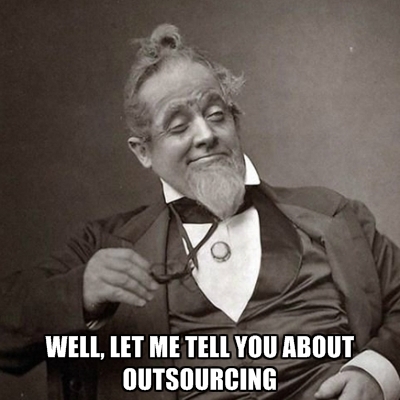
Knowing What and When to Outsource
Competing in the digital landscape usually means competing on several fronts. You need good design (product or web), solid tech (frontend and backend), strong marketing (acquisition and retention), and the talent to help make it all come together. Indeed, even on the marketing front, you need to find the right balance of SEO, PPC, affiliate marketing, and content, to name just a few.

As the old saying goes, however, Jack of all trades, master of none. No one company can (solely) excel at everything it does, but that’s also why companies tend to outsource at leastsome of what they do. Of course, knowing exactly what you should outsource and when you should do so is another thing altogether.
Do you delegate it to a team member even though they don’t specialize in it? Or do you hire additional staff to take care of it? Or do you pay a bit more to an agency or consultant because there’s not enough work to justify a full-time hire?
These are all questions worth asking when deciding whether or not to outsource, and like all business decisions, it’s one that should be based on a cost-benefit analysis. Not all costs are easily quantified and entered into a ledger, however, and a proper cost-benefit analysis requires that you factor in some less tangible costs. And when trying to identify and assess some of these hidden, intangible costs of outsourcing, there are a few questions you should be asking yourself.
What’s the Oppotunity Cost?
The first question you should ask is “What would be the opportunity cost?”. In other words, “What’s gonna suffer if you try to take this on internally?”.

At any given point, you only have so many resources. More often than not, those resources already have goals, mandates, and timelines. And if you take on anything else internally, some of those resources will need to be diverted. So you need to decide whether the relevant resources can justifiably be diverted from whatever else they’re doing.
If it’s just a question of postponing the company newsletter to get up a banner ad that’s actually going to drive sales, then diverting those resources probably makes sense. However, if it’s a question of completely suspending all your ad campaigns while you find a replacement for that media buyer who just quit with no notice, then you’ll want to carefully consider whether saving on agency/consultant fees are really worth the foregone revenues.
Is it Your Core Business?
The next question you’ll want to ask yourself is whether the project or deliverable you’re thinking of outsourcing is part of your core business or not. Even if you’re looking at something that your business regularly needs, it might not be worth managing in-house if it’s not part of your core business. After all, by trying to develop the necessary resources in-house, you can end up getting completely distracted from your actual business, and end up hurting your bottom line in the long-run a lot more than you think.
 For example, many companies require physical office space, and every office needs to be cleaned, right? Well, our office had a rotating cleaning schedule. That is, until we realized that the revenue or growth a team member could generate in the time it took them to tidy up the office far outweighed the cost of hiring something else to do it. So we ended up hiring one of my clients, Montreal Office Maintenance, not only because it made good financial sense, but because we’re in the marketing business, not the property management one.
For example, many companies require physical office space, and every office needs to be cleaned, right? Well, our office had a rotating cleaning schedule. That is, until we realized that the revenue or growth a team member could generate in the time it took them to tidy up the office far outweighed the cost of hiring something else to do it. So we ended up hiring one of my clients, Montreal Office Maintenance, not only because it made good financial sense, but because we’re in the marketing business, not the property management one.
What’s the Urgency?
The third question you need to consider has to do with how urgent something is. Especially if something is part of your core business, but arises suddenly, you might want to consider outsourcing it.

I mean, sure, maybe you (or one of your team members) should’ve anticipated the need, or maybe something that no one could’ve predicted popped up. But that’s not what matters. What matters is that it requires immediate attention (and execution), and diverting internal resources to deal with it will only completely disrupt some other part of your business.
As an agency man, I regularly get requests from clients to handle something that’s not part of our normal mandate with them. Simply put, the client ended up with overflow. It may be something we can handle, or we may refer them to someone else, but the point is that it’s something the client knows it can’t stall on and is better off paying a bit more to outsource it than to wait to get it done itself.
Counting More than Just the Beans
On paper, the idea of vertical integration sounds all fine and dandy, but like most things theoretical, it doesn’t always work in practice. Of course, there are cost efficiencies associated with taking things in-house, but there are still a slew of intangible, hard-to-quantify costs associated with them, too.
Just like you’re more likely to rent office space than try to build your own, you’ll want to rely on third-party service providers to support other aspects of your business. So don’t be pig-headed next time outsourcing is an option, and look beyond just the trees to see the big picture. Because even when costs aren’t tangible, the revenue/growth you can generate by being mindful of them are.